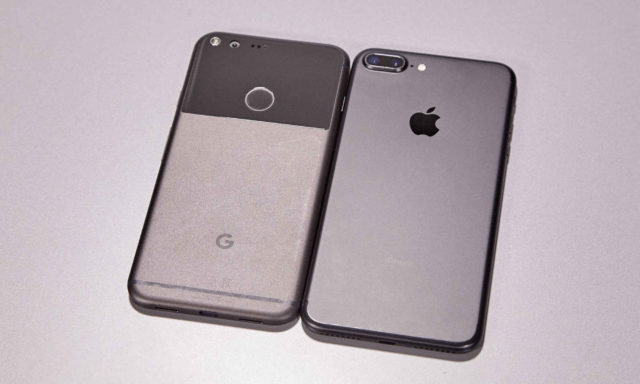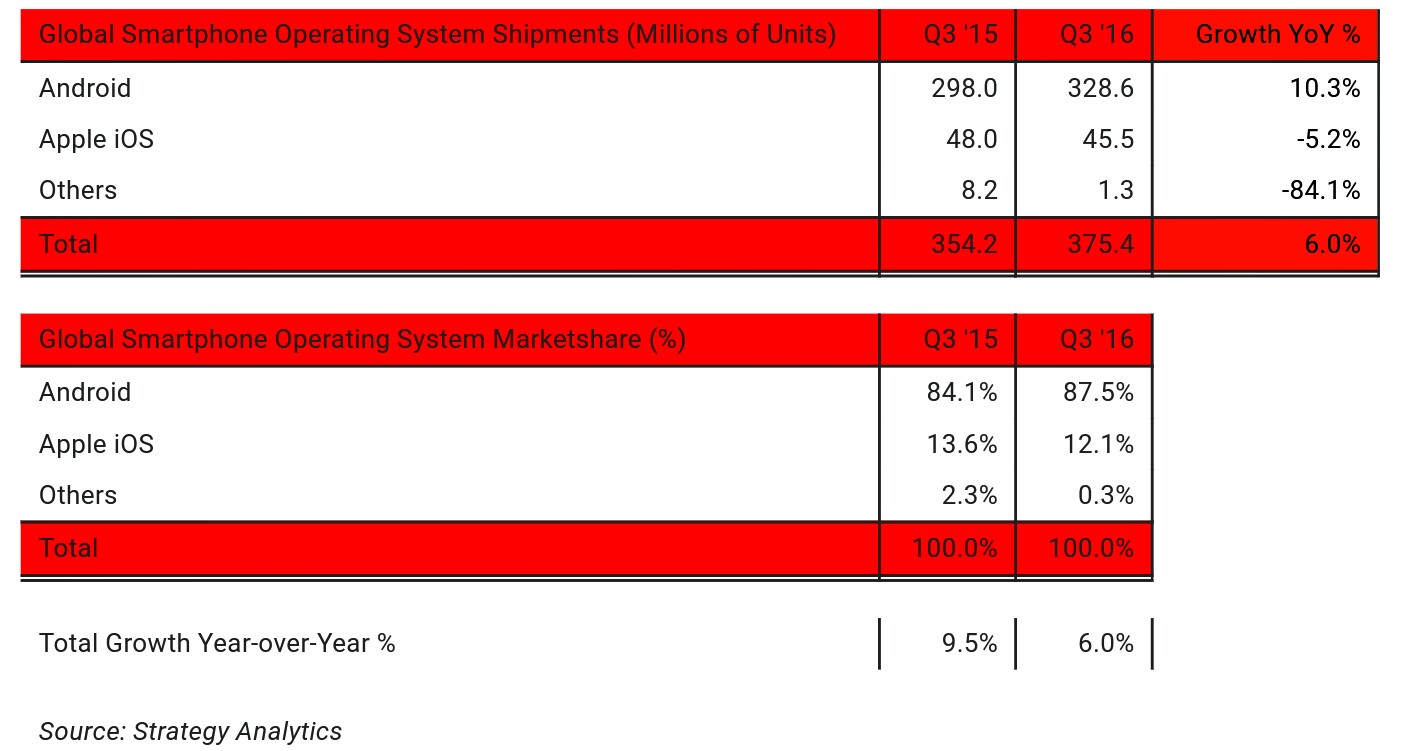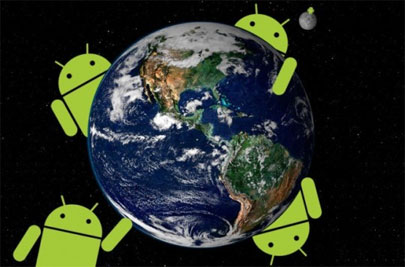Android increased its lead over iOS as a percentage of market share. This 'war' has run its course. But Apple quite possibly nothing to do with it.

Despite issues with the Note 7 and subsequent smartphone recalls, the Google platform managed to improve its market share in the third quarter. Global device shipments based on Android were up 10.3% year-over-year to 328.6 million, according to data from research firm Strategy Analytics released last Wednesday. Android occupies 87.5% of the global smartphone market share, the result for the same period last year was 84.1%. At the same time, due to a 5.2% drop in sales iPhone, the market share iOS decreased from 13.6% in the third quarter of 2015 to 12.1% in the previous quarter. For Microsoft and Blackberry's results were even more dire, with their operating systems virtually 'disappearing from the market'. The number of devices shipped not based on iOS or Android decreased by 84.1% compared to the same period last year.

“To date Android has achieved unattainable dominance in the global smartphone market,” said the head of Strategy Analytics. What drives users to transition to Android? User interest is steadily shifting towards the OS from Google. The report states that the low cost of production Android – the devices ultimately translate into the final price, making them more attractive in emerging markets. Moreover, Strategy Analytics researchers found a prevailing consumer perception that the interface Android is more user-centric.
Be that as it may, Avi Greenarth, director of research at Current Analysis, believes there is a stronger reason for global dominance Android. 'Speaking of market share percentages, not market size, budget devices do little to drive growth Android. They 'steal' this interest from regular mobile phones, not other smartphone platforms. ' Of course, success Android is nothing new, the operating system has been a major player in the global mobile OS market for a long time. Still, Apple has managed to attract consumers in key markets such as China, where iOS has 'won' a fraction of its market share from Android.

Based on the new data from Strategy Analytics, it can be assumed that iOS is unlikely to be able to 'catch up' in the near future Android. The problem for Apple in the third quarter was partly the reluctance of many users to buy a new one iPhone in anticipation of the release iPhone 7. As it turned out, the new product did not bring anything significantly new, did not justify expectations of users who have chosen the position of outside observers before the release of a new smartphone from Apple next year. However, Apple continues to lead in the most important segment of premium smartphones for itself. Greenarth thinks about this: 'Apple By and large, you don't need a market share advantage. Instead, the company needs a source of basic revenue sufficient to fund the development process, as well as a well-established large community of loyal users to maintain developer interest in the platform. iOS binds you more strongly than Android '.
Multiple rumors about the next iPhone contain speculation about new screen technology, a completely redesigned design and other important improvements. In other words, users expect iPhone 8 changes that they did not see in this year's model. For their part, Cupertino is satisfied with the sales results iPhone, according to their statement, every released device is being sold. But from the data from Strategy Analytics, we can conclude that for Apple the hope of defeating Google in the global battle of smartphones may be lost.
Original material, by Don Reisinger
Upon closer examination, it becomes clear that the trend described by the author has been observed for several years already, Apple continues to lead in the segment of premium devices, Android is gradually increasing its market share. And if the former are quite satisfied with this state of affairs, then Google definitely does not want to give up in the struggle for the top price range. This is evidenced by the Pixel devices, which seriously announced the intention of Google to argue with iPhone about the title of the universal flagship. If a certain stagnation in innovation for Apple, noted by some journalists, continues, then the positions of iPhone may well shake even more, in such a scenario everything will depend on the success of the next models of smartphones manufactured by Google. All the prerequisites for this have been created, there is no better time for an 'attack' for Google. And the campaign has already been launched.
Still, I would not so categorically declare the end of the confrontation between the two major players. In my opinion, the vector of 'warfare' will be revised, the main emphasis, perhaps, will shift to the 'race' of innovations. In this aspect, the trend is so far set by Google with the Daydream platform, Apple, according to rumors from MacRumors, it is only developing a project to use VR in its devices. From the user's point of view, it is difficult to say whether VR will become that key advantage of the Google platform or whether Apple will be able to once again offer something revolutionary and oppose a new product to VR innovations. Of course, market share is important, but is it interesting to the end consumer if the device cannot interest him and differs from previous models only in cosmetic changes and a slight increase in performance?
